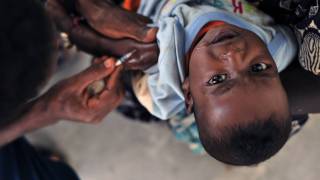Past Vaccination Rates Can Predict the Future

Why is it so challenging to increase the number of people vaccinated against a known infectious disease, such as measles?
A new research study from Dartmouth College shows that past problems with vaccines can cause a phenomenon known as ‘hysteresis’.
Hysteresis means creating a negative history that stiffens public resolve against vaccination, says these Dartmouth researchers.
Hysteresis prevents an increase in vaccination levels even after the negative objections have been cleared, making society increasingly vulnerable to disease outbreaks.
"Given all the benefits of vaccination, it's been a struggle to understand why vaccination rates can remain stubbornly low," said Feng Fu, Ph.D., an assistant professor of mathematics at Dartmouth College.
"History matters, and we now know that hysteresis is part of the answer,” Dr. Fu said in a press release.
The research, published in the journal Proceedings of the Royal Society B, is the first study to demonstrate that hysteresis can impact public health.
The Dartmouth research specifically studies how past problems associated with vaccinations can impact present and future vaccination decisions.
"Once people question the safety or effectiveness of a vaccine, it can be very difficult to get them to move beyond those negative associations.”
“Hysteresis is a powerful force that is difficult to break at a societal level," said Dr. Fu, who led the research team.
Previous studies have combined behavior models with epidemiology to understand the challenge of voluntary vaccination, but have been unable to completely explain the persistence of low vaccine compliance.
Low vaccine compliance is a public health issue that can cause the loss of "herd immunity" and can lead to the spread of infectious diseases.
In parts of Europe and North America, childhood diseases like measles, mumps, and pertussis have returned as a result of insufficient vaccination coverage.
During 2018, European countries reported over 60,000 measles cases.
As of December 1, 2018, 292 individual cases of measles have been confirmed in 26 states and the District of Columbia.
According to this research, the hysteresis loop can be caused by questions related to the risk and effectiveness of vaccines.
Negative experiences or perceptions related to vaccination impact the trend of uptake over time - known to the researchers as a "vaccination trajectory" that gets stuck in the hysteresis loop.
"When it comes to vaccination levels, the past predicts the future.”
“Unfortunately, this means that a lot of people are going to needlessly suffer unless we find a way to break the negative impact of the hysteresis loop," said Dr. Fu.
According to research published during 2018, one way to increase vaccination rates is with enhanced provider-patient conversations, such as:
- Trust Flu Information Delivered By Health Professionals
- Anti-Vaxx’ers Prove the Dunning-Kruger Test
- Addressing Parental Vaccine Concerns
- What Vaccine Info Should Adults Know?
By identifying the hysteresis effect in vaccination, this Dartmouth research team hopes that public health officials can design campaigns that increase voluntary vaccination rates, particularly by promoting vaccination as an altruistic behavior that is desired by moral and social norms.
Our Trust Standards: Medical Advisory Committee

























